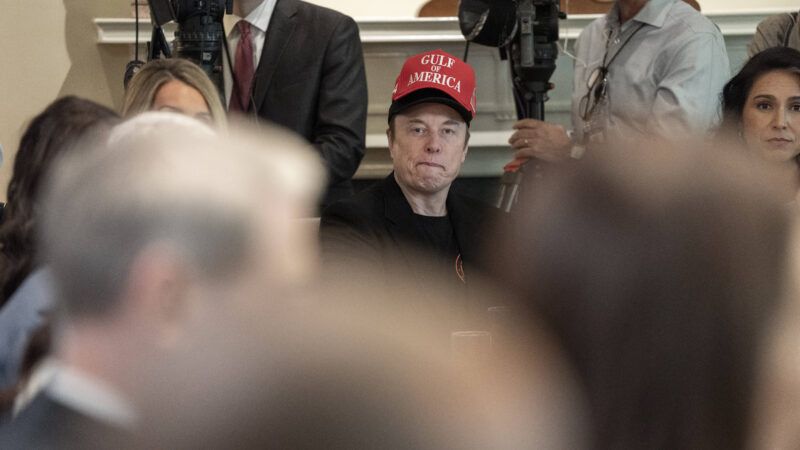Elon Musk Discovers That Serious Spending Cuts Are 'Really Difficult'
As he shifts his focus away from DOGE, he acknowledges the need for hard choices and congressional action.

As recently as March 27, Elon Musk was still confident that the Department of Government Efficiency (DOGE), the cost-cutting initiative he unofficially headed, could reduce annual federal spending by $1 trillion. But during a Cabinet meeting two weeks later, Musk projected that the savings in FY 2026, when DOGE sunsets, would be more like $150 billion.
Even the latter, much smaller number cannot be trusted, because DOGE has been vague about most of its purported cuts and has repeatedly exaggerated the ones it has specified. And last week, as he shifted his focus from DOGE back to his businesses, Musk acknowledged a reality that should have been obvious from the outset: Any serious attempt to address the country's looming fiscal crisis will require hard choices and congressional action.
Shortly before last year's presidential election, Musk breezily estimated that DOGE could cut annual federal spending by "at least" $2 trillion, which was about the size of the budget deficit in FY 2024. At a press conference in February, he reduced that target by 50 percent, saying DOGE could "cut the budget deficit in half" by insisting on "competence and caring."
That goal was always improbable, since it would require eliminating something like 63 percent of discretionary spending. And although Musk said DOGE would be "as transparent as possible," the project's documentation of its work has fallen far short of that promise.
As of Tuesday, DOGE's website claimed $165 billion in "estimated savings" from "asset sales, contract/lease cancellations and renegotiations, fraud and improper payment deletion, grant cancellations, interest savings, programmatic changes, regulatory savings, and workforce reductions." But DOGE's "Wall of Receipts" described just $69 billion in spending reductions, accounting for 42 percent of the purported total.
News organizations have identified many problems with those "receipts." The errors include contracts that were not actually canceled, contracts that were terminated during the Biden administration, iffy estimates of savings on contracts that had not been awarded yet, contracts that were counted multiple times, conflation of contract caps with actual spending, the inclusion of past spending in estimates of future savings, and overvaluation of contracts and grants.
DOGE's hyperbole is so pervasive that Manhattan Institute budget expert Jessica Riedl describes its work as "government spending-cut theater," saying "most of what is claimed to be spending cuts are just accounting errors." Somewhat more generously, Nat Malkus, a senior fellow at the American Enterprise Institute, estimates that DOGE's actual cuts amount to about half of the total it claims.
"They're just spinning their wheels, citing in many cases overstated or fake savings," Romina Boccia, director of budget and entitlement policy at the Cato Institute, told The New York Times last month. "What's most frustrating is that we agree with their goals. But we're watching them flail at achieving them."
DOGE's numbers do not distinguish between one-time savings and recurring savings or between total savings and annual savings. Some of its categories, such as "workforce reductions" and "programmatic changes," are plausible but vague, while others, such as "asset sales" and "regulatory savings," do not seem to imply any spending reductions at all.
In early March, President Donald Trump claimed DOGE already had identified "hundreds of billions of dollars of fraud." Although that clearly was not true, such savings should be possible.
Last year, the Government Accountability Office estimated that "the federal government could lose between $233 billion and $521 billion annually to fraud." Still, there is only so much that can be achieved without addressing the major components of the federal budget, including health care, Social Security, and military spending.
"If we don't do something about this deficit," Musk warned in February, "the country's going bankrupt." Back then, he implied that DOGE was up to that challenge. More recently, he has been singing a different tune.
"It's really difficult," Musk conceded last week. The question, he said, is whether there is "sufficient political will in Congress and elsewhere." Now he tells us.
© Copyright 2025 by Creators Syndicate Inc.


Show Comments (75)